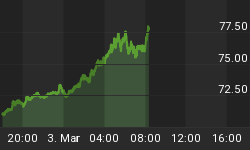Economically illiterate Financial Times writer Gillian Tett is singing the praises of inflation.
There's nothing special about being an economic illiterate. It's the norm.
What's unusual is the way Tett pretends to know what is best for everyone in Japan. "A generation has grown up thinking deflation is normal and desirable," says Tett.
Please consider Positive Ripples from Donald Trump's Victory Cheer Japan.
The election of Donald Trump has created all manner of unexpected winners. Think of US energy companies, holders of Russian roubles or Wall Street banks. Another institution which has reason to be cheerful about the US presidential election result is the mighty Bank of Japan.
The rally in US markets and the dollar, along with this week's increase in US interest rates, has created a glimmer of hope that Japan might be heading out of the twilight world of deflation and negative rates. If so, that would be extremely welcome — never mind the fact that the trigger for the tipping point has come from an unlikely source.
By any standards, Japan's central bank badly needs something to create an economic jolt. In recent years it has launched a bewildering list of policy experiments, with disappointing results.
If the decline in the yen against the dollar turns into a rout, that might spark a political backlash from Washington. If Mr Trump's economic plans turn out to be a mirage, investor disappointment will set in. If the Fed's decision to raise rates undermines US growth, this might dash the BoJ's hopes again.
Then there is the tricky, and fascinating, matter of consumer psychology. One of the most pernicious problems in Japan is that an entire generation has grown up thinking that deflation is not just normal but desirable too.
It may not be easy to change this mindset.
But even if hope for Japan is merely a glimmer, the point is this: it is suddenly possible to imagine Japan returning to a more normal world where yields rise, inflation is positive and the BoJ has credibility. If nothing else, it is a potent reminder of the power of political risk, for good and bad; and a lesson in the folly of predicting market movement with economic data alone. Particularly in the world of Trump.
Japan has the highest debt to GDP ratio in the G20. It achieved that dubious result fighting deflation.
Japan's debt load is so high, that an interest rate of a a couple percent would consume all tax revenue just to pay interest on the national debt.
Tett never explained why consumers are in misery by falling prices. Consumers everywhere like falling prices. Heck, I bet Tett would personally like shopping bargain.
Because of technology and rising productivity Falling prices are actually the norm. Such advances improve standards of living. In the absence of central bank manipulation prices would be stable.
It's central bank arrogance, like Tett's, to demand inflation in a deflationary world. The results speak for themselves: asset bubble booms and busts with increasing amplitude over time.
Economic Challenge to Keynesians
Of all the widely believed but patently false economic beliefs is the absurd notion that falling consumer prices are bad for the economy and something must be done about them.
I have commented on this many times and have been vindicated not only by sound economic theory but also by actual historical examples.
My article Deflation Bonanza! (And the Fool's Mission to Stop It) has a good synopsis.
And my Challenge to Keynesians "Prove Rising Prices Provide an Overall Economic Benefit" has gone unanswered.
There is no answer because history and logic both show that concerns over consumer price deflation are seriously misplaced.
The BIS did a study and found routine deflation was not any problem at all.
"Deflation may actually boost output. Lower prices increase real incomes and wealth. And they may also make export goods more competitive," stated the BIS study.
It's asset bubble deflation that is damaging.
And in central banks' seriously misguided attempts to fight routine consumer price deflation, central bankers create very destructive asset bubbles that eventually collapse.
When those bubble burst, and they will, it will trigger debt deflation, which is what central banks ought to fear.
For a discussion of the BIS study, please see Historical Perspective on CPI Deflations: How Damaging are They?
Meanwhile economically illiterate writers bemoan deflation, as do most economists and central banks. The final irony in this ridiculous mix is central bank policies stimulate massive wealth inequality fueled by soaring stock prices.
















